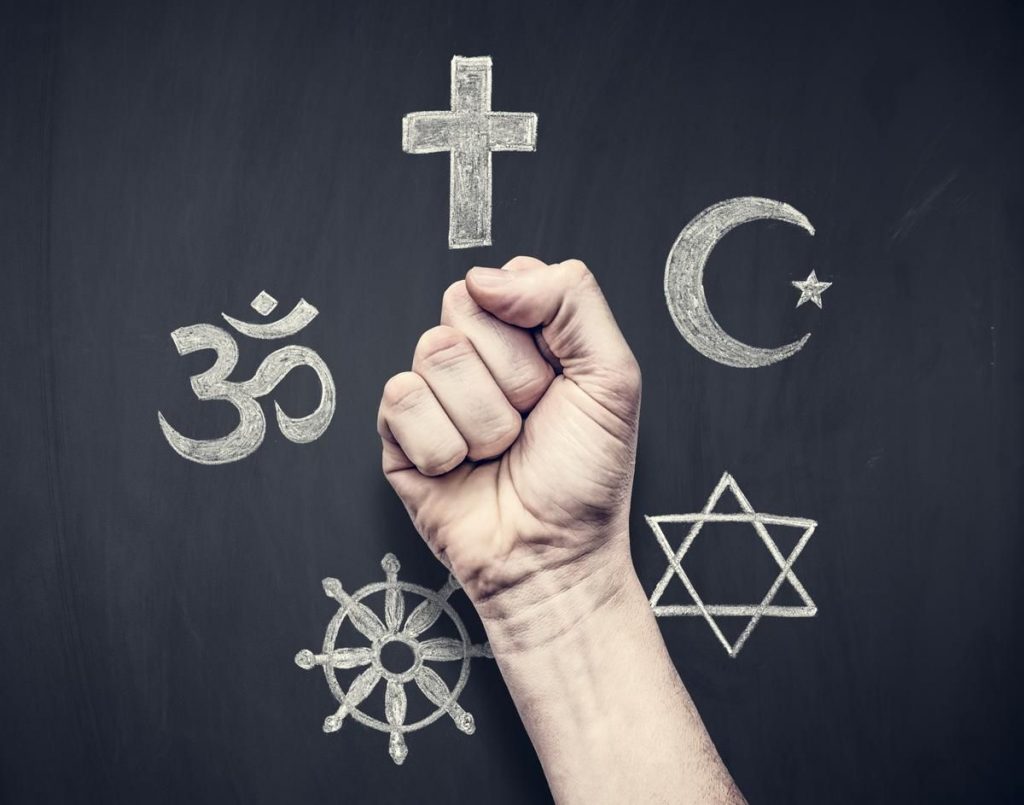
According to David Rapoport religious extremism is the fourth wave of terrorism that started in 1979, which is close to the Islamic revolution in Iran, the Soviet invasion in Afghanistan, and the storming and occupation of grand mosque in Mecca. Since then, there have been many religious groups
involved in terrorism, for example Islamic extremist groups in different countries including the Islamic State in Iraq and Syria (ISIS) as a global threat to humanity, Sikhs in Punjab from their holy temple in India, Jewish religious terrorists such those who murdered Yitzhak Rabin in Tel Aviv, Christian groups
such as anti-abortion militants and those responsible for the attack of the Tokyo subway. Looking into these examples, one can barely argue that religion has not been used as an active driver of conflicts worldwide. However, the good news is that an absolute small minority of the world’s population is fighting for those extremist groups.
The preamble of the UNESCO constitution states, “Since wars begin in the minds of men, it is in the minds of men that the defences of peace must be constructed.” Given that religion is a set of deeply habituated beliefs, norms, and values in mankind, it has a significant potential to connect humanity to one another and be a tool to contribute to the construction of peace in the minds of humanity.
In order to utilize religion as a potential tool for peace building, religious communities will have to take a long and deep look at themselves and, when appropriate, admit that not everything said in their cultural and value system promotes peace, and some of it leads to contention. Therefore, this fact needs to be acknowledged before identification of peaceful tools to promote peace. The process of extracting and focusing on the potential of religion for peace rather slot terbaru than conflict is delicate and hard, but necessary.
With the number of religions around the world that have effectively Judi Slot Online reached every small city and village, there are numerous religious “agents” available for peace-making. To further look into the potential agents for peace-making in different religions around the globe, we will look into some examples of Buddhism, Islam, and Christianity.
Buddhism favours the cause of peace-making and peace building. Its emphasis on the principle of nonviolence rather than force and oppression to convey the teaching of Buddha, to bear with opponents rather than dominate them, is a prominent stage for peacebuilding. In the Island of Sri-Lanka, where
Buddhism is a dominant religion; it is recorded that during the second century a Buddhist King went to fight non-Buddhists and won the bloody war. As a good Buddhist he expressed regret for all the people he killed. Some monks confronted him saying that he could only express his remorse to the Buddhist
victims, not the others. Unfortunately, such an ideology is still used by some groups of monks in Sri- Lanka and Burma to encourage conflict. However, there is profound potential for them to set aside the tradition of hatred and recover it with the teachings of King Ashoka, the famous Indian king who sought to promote religious tolerance and peace.
Similarly, according to Islam the root causes of human failure towards the establishment of peace and order is mankind’s incomplete submission to the will of God. Religion and public order are closely connected to Muslims and Sharia Law, but according to some extremist interpretations of Sharia Law,
tolerance of non-Muslims is highly constrained. The teachings of peace in slot bonus 100 Islam are very obvious and straightforward, and it is clearly stated in the Quran that “if a man kills a believer intentionally, his recompense is Hell, to abide therein slot gacor maxwin (forever): and the wrath and the curse of Allah are upon him, and a
dreadful penalty is prepared for him”. Also, some people asked the Apostle of Allah whose Islam is the best. He replied one who avoids harming others with his tongue and hand.
Moreover, in the case of the Democratic Republic of Congo the vagueness of the religious community’s interpretation on racial division in Christianity was obvious. Primarily, the Church in DRC played an important role in justifying the policy of apartheid and division of races in 1960, using the tower of Babel story. However, DRC revised its thinking in 1990, declaring that the concept of apartheid was totally in conflict with biblical teachings. The example of South Africa is very interesting to look into from a religious perspective. The interpretation was primarily used to legitimize racial conflict, and later on, helped to amend and finally create opportunity for peace.
These illustrations show that there is a huge potential for peace making through religion and also a need for the religious communities to search, in their respective traditions, the teachings of peace and to engage in critical self-assessment of their perspectives on conflict slot gacor gampang menang and peace approaches.
Featured image from spiritually.com
A. Naveed Noormal is a Fulbright Scholar and a Foreign Service Officer. He has served as a Senior Diplomat at the Embassy of Afghanistan in London and was Policy Lead at the Office of Deputy Foreign Minister at the Ministry of Foreign Affairs of Afghanistan. Mr. Noormal is a reader and contributor on foreign and public policy, regional cooperation, international relations, conflict management and negotiation as well as peace process. He holds a Masters degree in Conflict Resolution from the US, an MBA from the United Kingdom and a degree of Law from India. He is a fellow at the Harvard Humanitarian Initiative and Asia Foundation Development Program.
